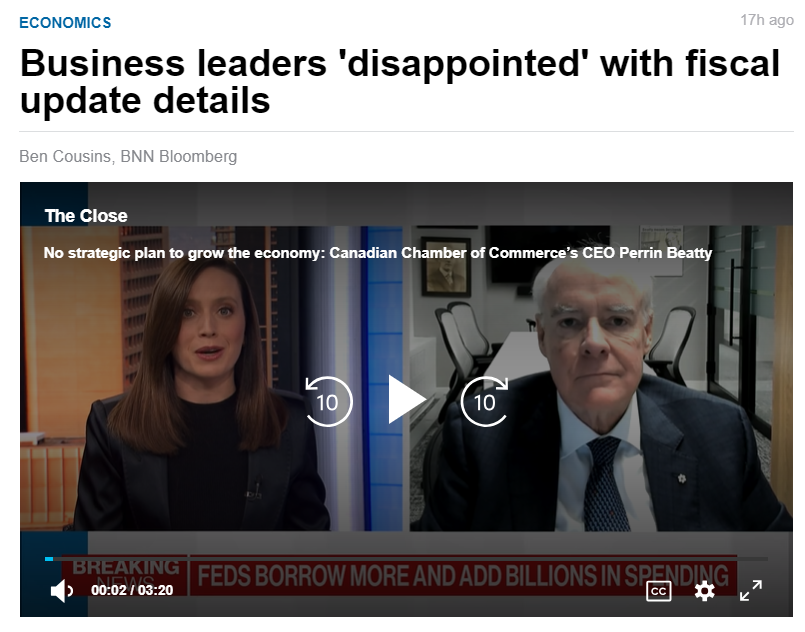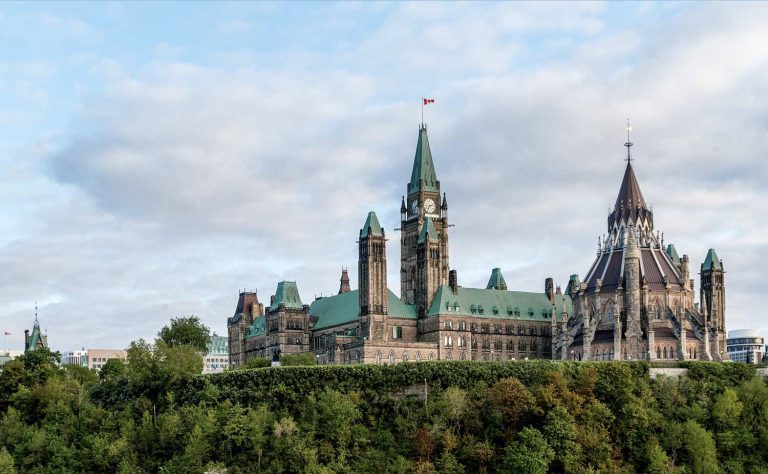News /
2023 Fall Economic Statement – Our Policy Experts’ Insights
2023 Fall Economic Statement – Our Policy Experts’ Insights
Policy experts from the Canadian Chamber of Commerce have reviewed the 2023 Fall Economic Statement (FES). Their perspective on its implications for Canadian business can be found below.

On November 21, 2023, the Government of Canada released its 2023 Fall Economic Statement (FES).
Policy experts from the Canadian Chamber of Commerce have reviewed the FES in detail, and their perspective on its implications for Canadian business can be found below.
General
Today’s Fall Economic Statement (FES) signals that the government heard the business community on issues such as addressing our housing needs and the importance of ensuring workers can work in any community where and when their skills are needed most. We all agree on the need for measures that will help build our homes, support businesses in finding the right talent, and ease the burden of doing business in Canada.
But more needs to be done, and Canada needs to move quickly. We applaud the intent of the government’s “delivery timeline” for investment tax credits for major decarbonization projects, but time has already been lost. We need to see carbon capture, utilization and storage (CCUS) projects moving ahead, and the government still needs to deliver on the plans it first announced in 2021 and in subsequent Budgets and statements. Business urgently needs to be able to work with government to invest jointly in these projects so we can fuel green economic growth, achieve our net-zero ambitions, and catalyze the private sector investment that will help pay for the services and social programs Canadians need.
There were also some concerning developments – including that the speed with which the Government is trying to push through changes to our competition laws does not leave enough time to predict or understand their full effects. If enacted, these changes to the Competition Act would apply to all Canadian businesses and could have significant unintended consequences, including reduced investment and the punishing of pro-competitive business conduct. We’re calling for the government to consult meaningfully with stakeholders on the proposed changes to the Competition Act.
Canada still urgently needs a plan for growth. Next year’s budget must address a number of key measures that weren’t included in the Fall Economic Statement or the 2023 budget, including long overdue measures to modernize the tax and regulatory system, investments in trade-enabling infrastructure that will strengthen supply chains, and initiatives to foster an innovative economy, maintain our leadership in Artificial Intelligence, ensure widespread adoption of cybersecurity, and advance digital health.
Matthew Holmes, Senior Vice President of Policy and Government Relations, Canadian Chamber of Commerce
Housing
The focus on housing in today’s Fall Economic Statement is welcome, as our economic future depends on Canadians having a home they can afford. Leveraging federal infrastructure funding to tackle regional barriers, while speeding up approvals, making more financing available, and addressing labour shortages will help create much-needed housing supply. We hope to see more ambition and bold action in the months to come.
Pascal Chan, Senior Director, Transportation, Infrastructure & Construction
Investment Tax Credits
We are delighted to see that legislation will be introduced this fall for the implementation of the Carbon Capture, Utilization, and Storage Investment Tax Credit (CCUS Tax Credit) and the Clean Technology Investment Tax Credit (CTI Tax Credit). These crucial incentives are essential for stimulating investments in decarbonization, facilitating the transition to low-carbon energy across all sectors of the economy, and aiding Canada in achieving its ambitious goal of net-zero emissions by 2050. However, despite a head start, Canada now finds itself trailing behind the United States and other jurisdictions in incentivizing clean technology and energy initiatives. It is imperative that the government swiftly introduces and passes legislation for the remaining three Investment Tax Credit (ITC) Programs. This proactive approach is necessary to prevent Canada from further lagging in the global competition for capital and investments in pivotal decarbonization projects.
Bryan N. Detchou, Senior Director, Natural Resources, Environment and Sustainability
Competition Policy
We are concerned that the speed with which the Government is trying to push through changes to our competition laws in Bill C-56 does not leave enough time for stakeholders to adequately evaluate and understand their effects. If enacted, these changes to the Competition Act, which applies to all Canadian businesses, could have significant unintended consequences, such as reduced investment and the punishing of pro-competitive business conduct. It is critical that the government properly consult with stakeholders on all proposed changes to the Competition Act.
Liam MacDonald, Policy Advisor
Indigenous Loan Guarantee Program
Recognizing that the journey toward achieving net-zero emissions is inextricably linked to Indigenous rights and participation, we welcome the government’s initiative to launch a new Indigenous Loan Guarantee Program. By fostering financial independence, these funds will amplify opportunities for Indigenous communities to engage, invest, and benefit from various commercial projects. As the program’s final intricacies take shape ahead of Budget 2024, we strongly advocate for its coverage across a spectrum of business opportunities, encompassing sectors such as mining, oil, and natural gas. This approach ensures that the benefits of economic empowerment extend broadly, fostering sustainable development and growth within Indigenous communities.
Bryan N. Detchou, Senior Director, Natural Resources, Environment and Sustainability
Carbon Contracts for Difference
We are delighted to gain additional insights into the issuance of Carbon Contracts for Difference (CCfDs), a pivotal initiative that holds the potential to drive Canada’s transition towards a more sustainable energy sector. CCfDs play a crucial role in facilitating the decarbonization process by mitigating risks associated with climate investments, providing investors with the assurance of a stable future price for carbon credits. The Canadian Chamber of Commerce applauds this forward-thinking approach, recognizing it as a strategic solution that harmonizes economic growth with a steadfast commitment to environmental stewardship.
Bryan N. Detchou, Senior Director, Natural Resources, Environment and Sustainability
Supply Chains
A positive step has been taken by the federal government in the Fall Economic Statement to consider reciprocity to protect our supply chains with our allies. However, our supply chains remain fragile due to lingering effects from the COVID-19 pandemic, ongoing geopolitical challenges, and recent strikes. The federal government needs to introduce more robust measures to build new trade infrastructure, create new business investment, and help Canadian businesses navigate uncertain economic times.
Alex Greco, Senior Director, Manufacturing & Value Chains
Artificial Intelligence (AI)
In the coming months, we hope to see the government further engage firms operating in Canada to help leverage the great potential of Artificial Intelligence (AI) to increase productivity and compete on the global stage. There is a great need for further investment in the adoption and commercialization of AI in the marketplace to strengthen Canada’s economy in a time of fierce international competition.
Ulrike Bahr-Gedalia, Senior Director, Digital Economy, Technology & Innovation
Digital Services Tax
We remain deeply troubled by the move towards a unilateral and discriminatory digital services tax. This decision contradicts the majority stance of the OECD/G20 Inclusive Framework and may breach Canada’s commitments under the USMCA and WTO. The proposed tax, targeting U.S. companies, has sparked bipartisan calls for retaliation in Congress and warnings from the Biden administration. The Chamber urges Canada to reverse its course, abandon unilateral actions, and re-engage in the OECD/G20-led multilateral process, including the extended DST moratorium.
Alex Gray, Senior Director, Fiscal and Financial Services Policy
Innovation/Research and Development
In recent years, the federal government has taken some steps to address gaps that exist in research and innovation. However, the Fall Economic Statement did not offer new details to reform research and development (R&D) programs and introduce new measures to help companies innovate and commercialize made-in-Canada products. Canada’s business community needs access to capital and reforms in R&D programs so that companies can invest in advanced technologies to improve productivity within their business operations.
Alex Greco, Senior Director, Manufacturing & Value Chains
Agriculture
The government needs to take action to support the agri-food sector, which is a key driver of Canada’s economic growth and prosperity. Unfortunately, the Fall Economic Statement does not include any much-needed progress on key files such as the Sustainable Agriculture Strategy, regulatory modernization, or the Grain Act Review. Properly investing in Canadian agriculture is a value-adding investment that can grow the economy.
Liam MacDonald, Policy Advisor
Labour
We are pleased to see the inclusion of the commitment to further remove barriers to internal labour mobility. Particularly, in sectors that face persistent labour supply challenges such as construction and healthcare. The Canadian Chamber of Commerce has been advocating for a number of years for increased collaboration with provinces and territories to foster flexible labour markets and policies easing potential barriers to mobility.
Diana Palmerin-Velasco, Senior Director, Future of Work
International
Noteworthy is the absence of commitments related to Canada’s international engagements, such as those related to global trade measures or national defense. For example, Canada’s Indo-Pacific Strategy isn’t mentioned. Additionally, in the current international context of heightened geopolitical tensions and threats, the absence of concrete measures to help Canadian businesses and our economy withstand global shocks is somewhat surprising.
Gaphel Kongtsa, Director, International Policy
Full Analysis
For our Chief Economist’s analysis of the 2023 Fall Economic Statement, click here.
Coverage
See below for media coverage of the Canadian Chamber’s response to the Fall Economic Statement.

Other News

Canadian Chamber Statement on the Conservative Party’s Commitment to Reversing the Capital Gains Tax Hike

The Cost of Canada-U.S. Trade Disruption on Full Display with New Trade Tracker




